#Prius
Anticlimactic Post Of The Day: Toyota Recalls, Freezes Sales Of Prius, Sai, Lexus Hybrids
It’s the software, stupid. At a press conference at 3:30 pm Japanese time, Toyota came clean and announced that it will recall 223,068 hybrid vehicles in Japan, including its latest Prius model and three other models–the Sai, the Lexus HS250h and the Prius Plug-In Hybrid, says the Nikkei [sub]. They will get a re-flash of the brake software. Worldwide recalls of affected models will follow. This ends – for now – weeks of waffling over the latest in a series of Toyota problems.
The recall will start Wednesday. A total of 199,666 Prius vehicles manufactured between April 20, 2009 and Jan. 27 of this year will receive new ABS software.
Toyota Recalls: (Un)intended Ambiguity?
Readers of the Nikkei [sub] were greeted this morning with the purported news that by the end of this month, Toyota “is expected” to recall its Sai and Lexus HS250h hybrids, which use the same braking system as the Prius hybrid. Furthermore, “the company is believed to have decided” to recall the current Prius, “and is expected” to notify the Transport Ministry of the plan early this week.
Prius Recall, Or Not? Toyota, A Mass Producer Of Confusion
After piles of books have been written about the „Toyota Way,“ this round of recalls will have a permanent place in the annals of how to completely NSFW-up crisis management. The epicenter of the disaster at Toyota is not in the pedal dept., it is not in the software development dept., it is in the Public Relations Department in Toyota City. Or possibly, right at the top.
Last Friday evening, Toyota trotted out their CEO and founder’s grandson Akio Toyoda to address the complaints about Prius brakes. Toyoda said nothing of substance. What irked the public, and what became instant fuel to the already raging fire, was that Akio Toyoda refused to address the fact that Toyota had changed the Prius software, and changed the braking hardware in January, for cars in production. People wanted to know what happens with the cars they had already bought. Akio Toyoda left his customers in a lurch. Answering in very bad English instead through an interpreter made matters worse.
A day later, Reuters wrote that Toyota will recall the Prius “in the next few days.” Who was the source? A Toyota spokesperson? Nah. A “person close to the matter?” Nope. The source was a Toyota car dealer. “Toyota officials were not immediately available to comment.”
Today, the Nikkei [sub] writes that Toyota “has decided to recall and repair free of charge the latest model of its Prius hybrid sold in the domestic market due to complaints over brake problems.” And who’s the source? A Toyota spokesperson? Nah.
Toyota's Prez. Meets Press Over Prius, Says Nothing
Oy, will they get slaughtered for that: So Toyota Prez. Akio Toyoda met the press late in the Japanese evening in Nagoya. And what did he say? Basically nothing. He said he “ordered swift action” to get a grip on the reported brake problems of the (in Japan) wildly popular Prius hybrid. But he didn’t say anything else. Recall? Shirimasen. (I don’t know.) Free repair if customer requests it? Shirimasen. Computer reflash? Shirimasen. Does Toyota know what’s going on? Shirimasen. Apparently, LaHood’s threat of bodily harm was lost in translation.
Toyota's Toyoda Meets The Press: Prius Recall Imminent. Or Not
Toyota’s President Akio Toyoda will do something highly unusual tonight: The usually reclusive CEO will meet the press in Nagoya on Friday night at 9 p.m. Japanese time to discuss product quality, says the Nikkei [sub]. Toyoda won’t face the Fourth Estate all alone. Executive Vice President Shinichi Sasaki will also attend, and hopefully deflect the worst.
The press conference is not for Japanese consumption. Friday night at 9, most papers are put to bed, and the evening news are over. The meeting is for U.S. consumption. Friday night at 9 in Nagoya is 7 a.m. in New York.
Are The Prius And Fusion Hybrid Brake Issues Related?
Ford says emphatically no, but the evidence (such as it is) indicates certain similarities. Let’s take a look…
BREAKING: Toyota To Recall 270k 2010 Priuses, Similar Problems Reported On Ford Hybrids [Updated With Ford Press Release]
According to MSNBC, Toyota’s US-based spokesfolks are refusing to confirm a Nikkei report that Toyota has issued a recall of 270,000 2010 model-year Priuses for brake issues the company has already acknowledged. “We have no information on any decision to recall the Prius,” said Toyota Motor Sales USA spokesman John Hanson, who said the company is working with the NHTSA on a “preliminary evaluation” of the problem. According to another report, the recall (which will be filed “shortly”) involves 100k Priuses in the US market, with the remaining 176k in Japan.
While Toyota may or may not recall the Prius, Ford is not recalling its Fusion and Mercury Milan Hybrids for what appears to be a similar issue (poor transitions between regenerative and conventional brakes). Instead, Ford is instituting a “Customer Satisfaction Program” involving free software upgrades it says will fix the problem, which was first reported by Consumer Reports.
UPDATE: Ford responds with a press release after the jump.
UPDATE 2: While we sort some of these late-breaking developments out, here’s another spurious log for the fire: ABC News impugns “federal investigations were extremely limited in scope, after negotiations involving former safety investigators who had been recruited to work for Toyota’s Washington, D.C. office.”
UPDATE 3: Oy!
Toyota Admits: Prius Brakes Can Get Confused On Icy Roads
Complaints about allegedly faulty Prius brakes are growing by the minute. This morning’s Nikkei reports that in addition to the 14 complaints received by Japan’s Transport Ministry, dealers in Japan are handling 77. Today, Toyota conceded that the brakes can get confused on icy roads.
Prius Brakes Fail In Japan and U.S.A.
And the hits, they keep on coming. Now, brakes of the Prius flake out.
Japan’s transport ministry has received 14 complaints about problems with brakes on Toyota’s latest. The ministry has asked Toyota to investigate the complaints, says the Nikkei [sub.] “Those are purely reported cases, so we still need to investigate to find out where problems really exist,” said a ministry spokesman, who said that the number of complaint over such a short time-span “more than usual.” There is more in the U.S.A.
Toyota Plans To Produce 1 Million Hybrids In 2011, But What About The Quality?
Toyota’s head start on hybrid technology is easily the most significant advantage any one automaker holds over any other. It’s next closest competitor in hybrid offerings is Honda which is facing serious challenges as its Prius competitor, the Insight, is off to an incredibly weak start. To capitalize on this advantage, Toyota plans to up annual production of its hybrids to one million units by 2011. Despite reports that Toyota is refocusing on hydrogen fuel cell vehicles as a long-term option, Yoshihiko Tabei, chief analyst at Kazaka Securities believes:
For the foreseeable future, the focus of Toyota’s (low-emission car) strategy will be on hybrids, not electric or fuel-cell cars. Except for Honda, Toyota is facing little competition in hybrids and is set to put distance between itself and other automakers
Piston Slap: Long Term Ramifications of Prius Abuse?
TTAC Commentator 1981.911.sc writes:
So, today I passed a guy putting gas in his Prius on the side of the road. I assume he ran out of gas. Irony?
My question: can a Prius run on just battery power when the gas tank is empty? And if this guy ran it out of gas AND drained the battery, was he FUBAR? I assume it has to have a good battery to run, gas in the tank or not.
Curbside Classic: 2001 Toyota Prius
A happy marriage isn’t exactly the easiest thing to engineer. Gasoline and electricity are about as compatible as Donald Trump and Mother Theresa. I know, Ferdinand Porsche built a “hybrid” in 1899, and there have been others since. But its time to bust the very myth that I’ve been guilty of perpetuating myself: Porsche’s “Mixte” wasn’t a real hybrid. It was an EV with a gas generator to extend its range when the battery gave out, just like the Volt. That’s like calling a single guy with a house cleaner and a hooker “married”. But the Toyota engineers pulled it off, teaching the two oldest propulsion systems how to dance, simultaneously. And in doing so, the Prius has become the most revolutionary car since the Model T.
Toyota Restarts Plant Contruction As Currency Worries Outweigh Falling Demand
Volt Birth Watch 174: Enough With The Prius Comparisons!
As we saw in the last VBW, the Volt’s range-extender still needs some software work. But efforts to to keep the gas engine from acting like a thrashing, disembodied dervish will have to balance the desire for smooth operation and maximum efficiency. And it’s looking like efficiency in charge sustaining (CS) mode won’t match the hybrid standard-setters. Volt chief powertrain engineer Alex Cattelan breaks the news gently to the true believers at GM-volt.com
You’ve got to understand that all of the decisions that we’ve made around this product are made because its an EV. That is the first and foremost thing that it needs to be. So because it is an EV some of the decisions that we’ve made around engine operation will be different than what Toyota makes in its parallel hybrid. For them they are always operating in hybrid mode so they need to optimize everything for engine operation.
In our case we’re optimizing everything for EV operation and the secondary is certainly going to be better than conventional vehicles, but were not necessarily totally optimizing the system for charge sustaining mode because we don’t want to compromise electric vehicle mode.





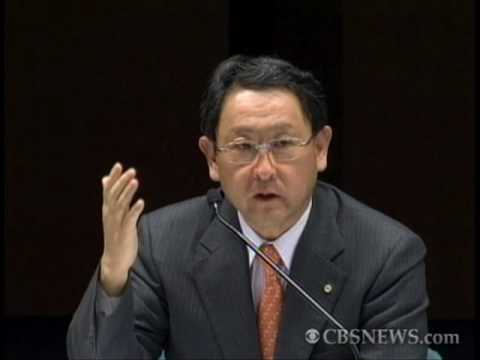





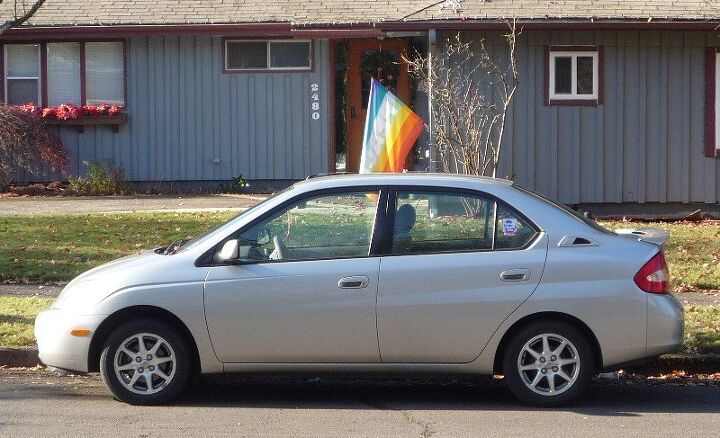
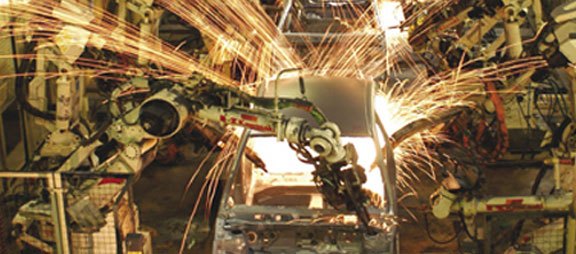
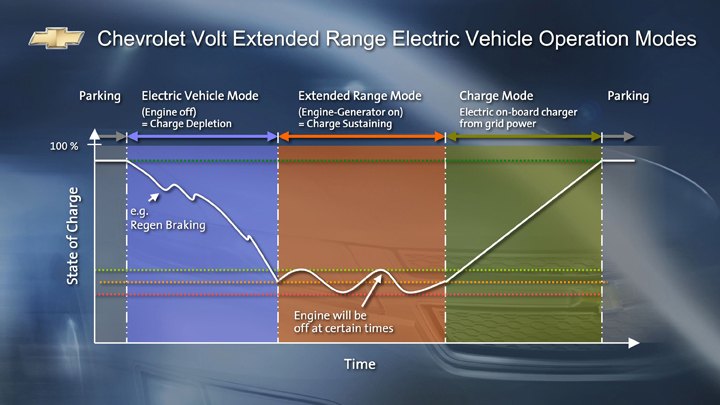
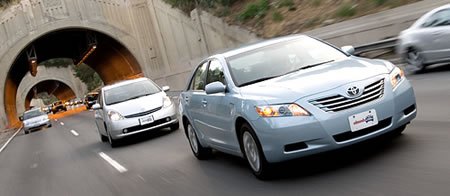












Recent Comments